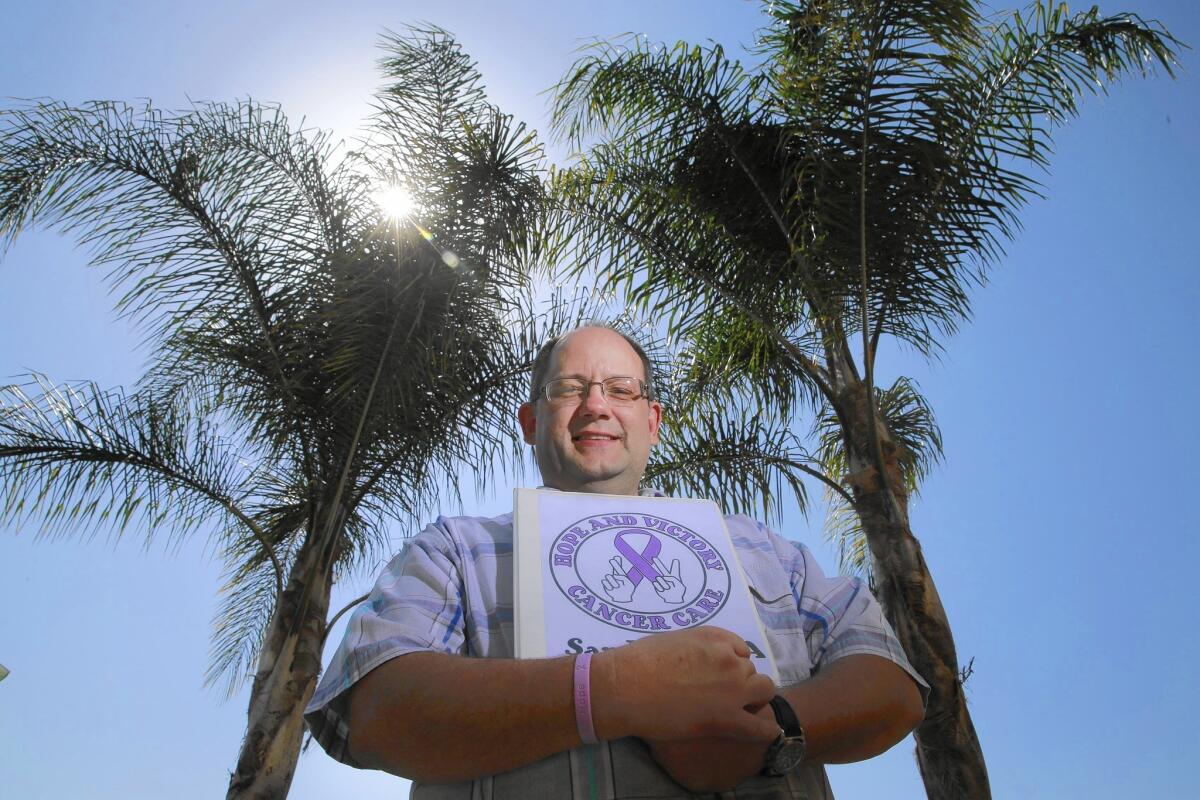Rising healthcare costs are pressuring patients

Brian Tieber, 47, a former facilities manager from San Diego, is in remission after battling advanced stage cancer. When he was diagnosed in 2012, the tight budget that he and his wife managed got much tougher.
- Share via
Coping with ever-increasing medical bills is frustrating — and getting more so.
A recent survey by private health insurance exchange EHealth highlights the pressure Americans are feeling. It found that more than 6 in 10 people say they’re more worried about the financial effect of expensive medical emergencies and paying for healthcare than about funding retirement or covering their kids’ education.
People who get health insurance through work and on their own have seen their costs rise dramatically over the last decade.
According to the Commonwealth Fund, a New York think tank, annual increases in work-based health plan premiums rose three times faster than wages from 2003 to 2013. Out-of-pocket costs have also been climbing.
“More people have deductibles than ever before,” says Sara Collins, a Commonwealth Fund vice president. From 2003 to 2013, the size of deductibles has grown nearly 150%.
Whether a person is coping with a severe illness or trying to deal with everyday medical costs, the challenges are many.
Ask Brian Tieber, 47, a former facilities manager from San Diego who is now in remission after battling advanced-stage cancer.
When he was diagnosed in 2012, the tight budget that he and his wife managed got much tougher.
Aggressive treatment required a five-day hospital stay every 28 days that took a huge physical and financial toll. It made it impossible for him to continue working.
“Because of my condition I had to give up my job,” he says. Tieber is insured under a health plan from his wife’s employer, which offers comprehensive coverage. There were co-pays for many of his office visits, but his most intensive and expensive cancer treatments were covered. He’s grateful to have insurance, but says the health plan is still a big financial burden for him and his family.
Bradley Konia of Burbank faces a different type of financial angst. He finds the health plan he buys on his own to be fairly reasonably priced at $265 a month.
But the plan comes with a $5,000 deductible he must meet before getting help with medical bills from his insurer.
The 46-year-old marketing professional takes just one prescription medication. He pays $137 a month, up from $60 last year. “I’m paying for all of it out of pocket even though I have insurance,” he says.
Konia says he’s able to cover his current costs without much strain, but he worries about unexpected medical expenses if he were to become sick or even require a second prescription drug.
“If something were to happen,” he says, “I would be in a bad situation.”
For the better part of a decade, healthcare costs have been eating up a growing share of the family budget, says Paul Fronstin, director of the Health Research & Education Program with the Employee Benefit Research Institute. “It’s affected their ability to pay for basic necessities.”
Studies conducted by Fronstin’s organization have consistently found that workers have increased credit card debt and cut back on retirement and other savings to pay for healthcare.
Though much has been made of a slowdown in the rate at which U.S. healthcare costs have risen in recent years, that trend hasn’t translated into financial relief for patients.
“The overall cost to everybody has slowed, but one of the reasons they’ve slowed is that there’s been a shifting of costs to patients,” says Paul Ginsburg, director of public policy with USC’s Schaeffer Center for Health Policy and Economics.
How much more can our wallets take?
“We’re reaching a backlash, because there is only so much pressure you can put on consumers,” says David Newman, executive director of the Health Care Cost Institute, a non-partisan, nonprofit organization in Washington, D.C.
A number of cost-lowering tools are being tested in our healthcare system to relieve patients’ financial strain.
For example, the healthcare industry is under pressure to be more open about what it charges for care, and a growing number of tools are available to help patients shop by price. Newman’s institute recently released a tool for consumers to look up healthcare costs, at guroo.com. FairHealthConsumer.org and HealthBlueBook.com also offer cost tools.
Still, although patients are being pushed to be more aware of costs, openness about pricing in healthcare remains more theory than reality.
Relief from high medical expenses, Newman said, will ultimately need to come from inside the healthcare system.
Pressure to disclose healthcare prices is likely to cause doctors to be more price-conscious when suggesting treatments, he says, and cause employers and insurers to reshape health plans in ways that lower costs.
Ginsburg of USC says he sees hope for relief from skyrocketing healthcare costs. But it won’t come soon, he acknowledges. “There’s a long way to go.”
Twitter: @LisaZamosky
Zamosky is the author of “Healthcare, Insurance, and You: The Savvy Consumer’s Guide.”
More to Read
Inside the business of entertainment
The Wide Shot brings you news, analysis and insights on everything from streaming wars to production — and what it all means for the future.
You may occasionally receive promotional content from the Los Angeles Times.










